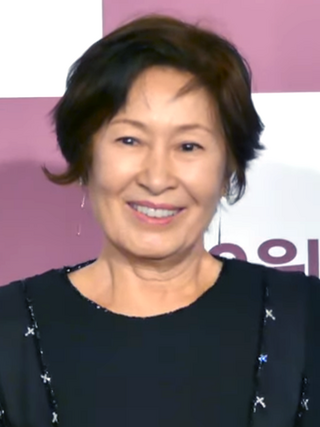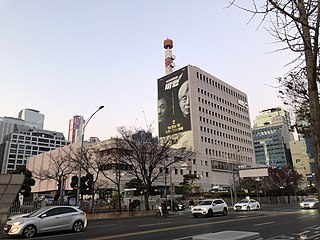International mass media of South Korea includes newspapers, television broadcasts, and radio broadcasts.
Arirang TV is an international TV broadcast channel based in South Korea. As of December 2023, It is broadcasting to about 146 million households worldwide through eight satellites. [1]
KBS WORLD TV is a 24-hour entertainment channel operated by the Korean public broadcaster KBS. [2] The channel is broadcast in Korean language with multilingual subtitles. It is available to 140 million households in 142 countries. [3]
Arirang Radio provides Korean culture, K-pop, tourism, and tips on living in South Korea. [4]
KBS World Radio opened in 1953 as South Korea's first English radio station for foreigners residing in Korea under the name of "Voice of Free Korea." [5] The station broadcasts news and programs in 11 languages, including Korean and English, Chinese, Japanese, Indonesian, Arabic, Vietnamese, Russian, German, French, and Spanish.
The Korea Herald is an English-language newspaper that distributes South Korean-related content to more than 80 countries around the world. [6]
Korea JoongAng Daily has been publishing print editions of the two newspapers in cooperation with the New York Times since 2000.
The Korea Times published its first issue in 1950. The Korea Times publishes 20 pages every day from Monday to Friday. [7]
In South Korea, telecommunications services improved dramatically in the 1980s with the assistance of foreign partners and as a result of the development of the electronics industry. The number of telephones in use in 1987 reached 9.2 million, a considerable increase from 1980, when there were 2.8 million subscribers.

The Korean Broadcasting System is the national broadcaster of South Korea. Founded in 1927, it is one of the leading South Korean television and radio broadcasters.
In South Korea, there are a number of national television networks, the three largest of which are KBS, MBC, and SBS. Most of the major television studios are located on Yeouido and Sangam-dong, Seoul. South Korea became the fourth adopter in Asia when television broadcasting began on 12 May 1956 with the opening of HLKZ-TV, a commercially operated television station. HLKZ-TV was established by the RCA Distribution Company (KORCAD) in Seoul with 186–192 MHz, 100-watt output, and 525 scanning lines.

Yonhap News TV, stylised as YONHAP NEWS TV, is a South Korean pay television network and broadcasting company, owned by the Yonhap News Agency-led consortium. It began broadcasting on 1 December 2011. Yonhap News TV started broadcasting with four new South Korean nationwide generalist cable TV networks. Those are JoongAng Ilbo's JTBC, Dong-A Ilbo's Channel A, Chosun Ilbo's TV Chosun, and Maeil Kyungje's MBN in 2011. The four new networks supplement existing conventional free-to-air TV networks like KBS, MBC, SBS, and other smaller channels launched following deregulation in 1990.

The Korea International Broadcasting Foundation is a South Korean non-profit organization established to broadcast Korean content to promote interest in Korea globally. The foundation operates Arirang TV and Arirang Radio.

The JoongAng, formally known as JoongAng Ilbo, is a South Korean daily newspaper published in Seoul, South Korea. It is one of the three biggest newspapers in South Korea, and a newspaper of record for South Korea. The paper also publishes an English edition, Korea JoongAng Daily, in alliance with the International New York Times. It is often regarded as the holding company of JoongAng Group chaebol as it is owner of various affiliates, such as the broadcast station and drama producing company JTBC, and movie theatres chain Megabox.

Arirang TV (Arirang International Broadcasting) (Korean: 아리랑 국제방송) is a South Korean-based broadcasting company operated by the International Broadcasting Foundation. It provides English information on current events, culture, and history of Korea to the surrounding areas of Korea. Arirang TV (Arirang International Broadcasting) is named after the Korean traditional folk song “Arirang.”

The South Korean mass media consist of several different types of public communication of news: television, radio, cinema, newspapers, magazines, and Internet-based websites.
KBS World is the Korean Broadcasting System's international broadcasting service. It consists of KBS World Radio, KBS World television channel and KBS Korea.
Radio jamming on the Korean Peninsula makes the border region one of the world's busiest places for radio signals. Medium wave jamming is dominant in the area including Seoul and the Korean Demilitarized Zone (DMZ). South Korea jams all radio and television broadcasts from North Korea, and until 2013 jammed all foreign broadcasts, which was ended during the Park Geun-hye administration.
Jenny Cho (Jenny Jo) (Korean: 제니조; Korean name: 조효빈; born August 21, 1983), better known by her on-air name, Jenny Jo, is a second generation Korean-American broadcaster.

Kim Hye-ja is a South Korean actress and humanitarian. Best known to South Korean audiences as the archetypal mother figure in popular television series such as Country Diaries (1980–2002), What Is Love? (1991), My Mother's Sea (1993) and Roses and Beansprouts (1999). Kim drew international critical acclaim in the noir thriller Mother (2009),The Light in Your Eyes (2019) and Our Blues (2022).
KBS World is a South Korean pay television channel operated by the Korean Broadcasting System aimed at international audiences outside South Korea. It was launched on 1 July 2003 and mainly broadcast in Korean, but subtitles in English, Chinese and Malay are also provided.
Song Joong-ki is a South Korean actor. He rose to fame in the historical coming-of-age drama Sungkyunkwan Scandal (2010) and the variety show Running Man (2010–2011) as one of the original cast members. Since then, he has played a diverse spectrum of roles in the television series The Innocent Man (2012), Descendants of the Sun (2016), Arthdal Chronicles (2019), Vincenzo (2021), and Reborn Rich (2022), as well as the hit films A Werewolf Boy (2012), The Battleship Island (2017), and Space Sweepers (2021).

Lee Kyung-kyu is a South Korean actor, comedian, MC, film producer, and screenwriter. He was the highest paid entertainer on the KBS network in 2010, with earnings of ₩535 million.

JTBC is a South Korean nationwide pay television network. Its primary shareholder is JoongAng Holdings, with a 25% stake. It was launched on 1 December 2011. JTBC is a generalist channel, with programming consisting of television series, variety shows, and news broadcasting; its news division is held in similar regard to the three main terrestrial networks in South Korea.

Channel A Corporation, known as Channel A, is a nationwide generalist cable TV network and broadcasting company in South Korea. The company's largest shareholder is Dong-A Media Group (DAMG), which consists of 12 affiliate companies including The Dong-a Ilbo. Channel A was launched on 1 December 2011. Channel A's management philosophy is 'Open & Creative' and the company slogan is 'Channel A, A Canvas that Holds Your Dreams.' JaeHo Kim is the chief executive officer.

Tongyang Broadcasting Company was a South Korean commercial television station which was merged by the government with KBS. It was owned by the Samsung Group founder Lee Byung-chul.
Arirang Radio is an English-language South Korean television network based in Seoul and aimed at an overseas audience. It is operated by the Korea International Broadcasting Foundation and is financially supported by the Ministry of Culture, Sports and Tourism. The channel, which airs in 103 countries, aims to offer an extensive and informative view of Korea Peninsula affairs, as well as world issues from a global perspective.

"Rain" is a song by South Korean singer Kim Tae-yeon, a member of the South Korean girl group Girls' Generation. It was released digitally by SM Entertainment on February 3, 2016.